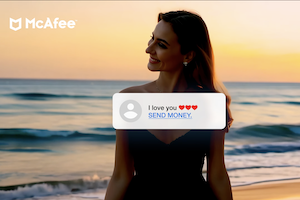- Updates to Cisco’s Executive Leadership Team
- Google offers AI certification for business leaders now - and the training is free
- CompTIA cert targets operational cybersecurity skills
- This Samsung tablet has the power and polish to rival the iPad Air
- You can make a photo come alive with TikTok's new AI tool - here's how
Keep It Real: How McAfee Is Using AI to Fight AI—and End Scam Stigma | McAfee Blog

Was that spinning head a mistake—or the whole point?
When McAfee dropped a new digital ad showing a woman lounging on a beach, only to have her head rotate a full 360 degrees, the internet lit up. Some viewers thought it was a post-production error. Others assumed it was a weird deepfake gone wrong. And while a few sharp-eyed commentators caught the joke right away, most were left wondering: was this brilliant marketing or a complete fail?
Spoiler: it was on purpose.
AI on Purpose
You may have seen the ad—the calm beach scene, the casual vibe, and then, the fully rotating head. Reactions ranged from confused to amused, with a handful of keen observers nodding in understanding.
We didn’t mess up.
With the help of our creative agency VSA, we developed a series of digital ads using generative AI to blur the line between real and surreal. The goal? To make a bigger point: AI is now capable of mimicking reality in subtle, clever ways that are increasingly hard to detect. That’s exactly why tools like McAfee’s Scam Detector matter more than ever.
“While the ads are clearly AI, the implication is that AI isn’t always so easy to spot,” said Anne-Marie Rosser, CEO of VSA. “It’s funny, and it creates empathy for the user since we’re all susceptible.”
And don’t worry—we didn’t hand everything over to the machines. McAfee and VSA’s full creative and design teams were instrumental in shaping every detail, from concept to execution. The AI was a tool. The vision came from real people.
These creative choices reflect our philosophy at McAfee: take cybersecurity seriously, but don’t always take yourself too seriously. Humor has the power to break through fear and shame—and ultimately, help people protect themselves better.
Scam Stories, Real People
Alongside these eye-catching ads, we’re launching Scam Stories, a social campaign built around real voices. From concert ticket scams to spoofed customer service texts, people across the country are sharing their experiences using #KeepItReal and #MyScamStory—and we’re listening.
Some of those individuals, like actor Chris Carmack (of Grey’s Anatomy and The O.C.), have joined our campaign to share their own moments of being duped. Others, like cyber student Henry or life coach Cory, are helping us educate others by turning personal pain into public empowerment.
Partnering for Impact
This campaign isn’t just about awareness—it’s about action. That’s why we’ve partnered with FightCybercrime.org, a nonprofit that helps people recognize, report, and recover from scams. We’re donating $50,000 worth of McAfee protection to people in FightCybercrime programs and to the volunteers who support them.
We’re also teaming up to expand education efforts through our Online Safety for Kids initiative—because building a safer internet starts early.
What’s Next
Scammers rely on silence, shame, and speed. But when we slow down, speak up, and share our stories, we take away their power.
The Keep It Real campaign is more than just a product launch. It’s a movement to stop the stigma around scams, help people protect their peace of mind, and remind you: if it can happen to Chris Carmack, it can happen to anyone.

